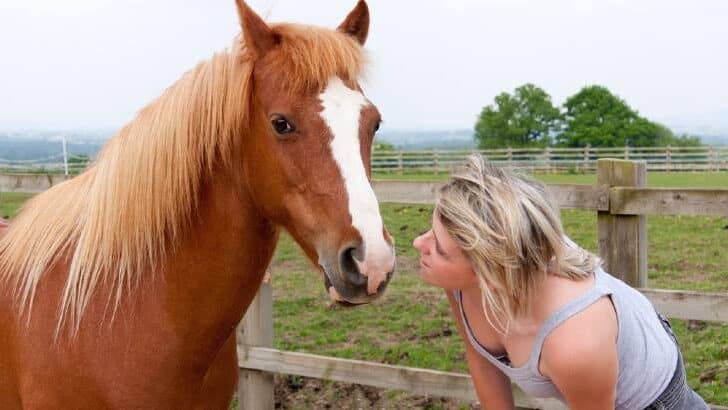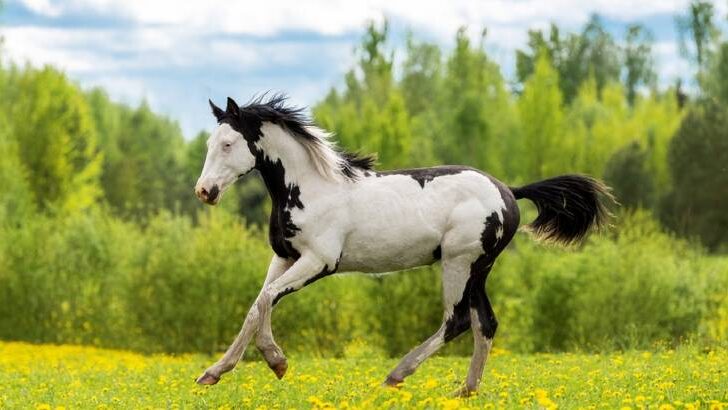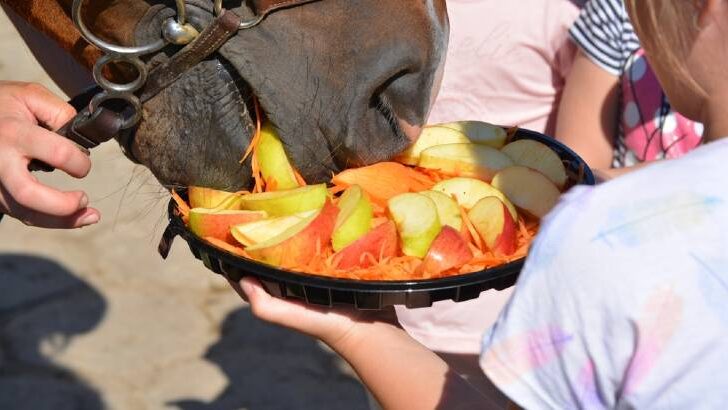Affiliate Disclaimer
As an Amazon Associate I earn from qualifying purchases. It helps me keep the website going. Thank you for your support.
Almost every horse owner will talk to their horse. From issuing commands to calling them in from the field, words feature heavily in human interactions with horses. Some owners even report that discussing their day or problems with their horses helps calm them. But do horses understand words, or is it simply just noise to them?
Horses can understand words, but only if they are trained to do so. However, these words are understood based on the tone and pitch at which they are said. Horses don’t understand language or words in general. Instead, they communicate through body language and sounds, such as whinnies or nickers.
Horses are intelligent creatures and can be taught a number of different things. Horses can memorize words used to cue them to perform certain actions, such as the transition from trot to canter. Read on to learn more about how horses recognize and understand words.
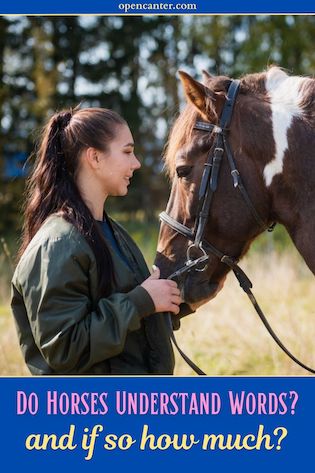
Naturally, Do Horses Understand Words?
In short, no. Horses were not born with an understanding of human language or words. They communicate predominantly through body language, rather than through voice.
It is only over thousands of years of domestication that horses have learned to respond to words. This is likely because they are subjected to human language throughout their lives.
That being said, a horse can use the tone, pitch, and volume of words to interpret a situation. They don’t understand the words that are being said, but they understand other parts of the conversation. These include the sound of the person’s voice and the body language used while speaking.
For example, a horse will be able to tell when someone is having an argument. Their voice will be louder, and they may be moving their arms around in anger. Their tone will be more forceful and abrupt than their normal speaking voice. The horse doesn’t understand what the argument is about but does know that the person is upset or angry.
Can Horses be Trained to Understand Words?
Many horses are trained to respond to certain words used as verbal cues. These are often words such as ‘whoa’, ‘back’, ‘steady’, or ‘stand’. Some horses understand words for walk, trot, canter, and halt. However, responses to these words were trained.
This training occurs most often through pressure and release training. For example, a horse being lunged regularly might learn to respond to vocal cues. To start off with, the horse is responding primarily to another stimulus, like a whip. The handler may say ‘canter’, but the horse canters due to the movement of the whip. Over time, the horse learns to associate the word ‘canter’ with being asked to go faster. Eventually, the handler will not need to use the whip, as the word ‘canter’ is enough to cue the horse.
This can also be seen in reward-based training. The handler will cue the horse, perhaps by saying ‘up’ to lift a hoof. If the horse lifts its hoof, it is rewarded with food.
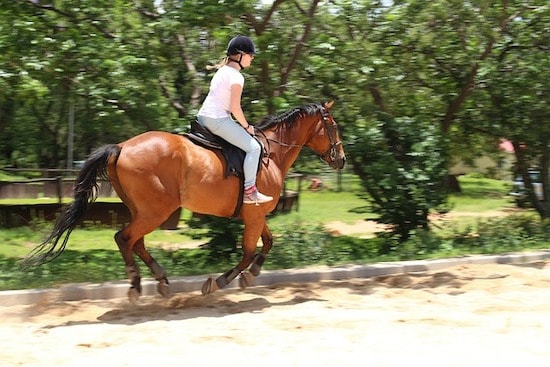
How Many Words Can Horses Remember?
It is unknown if there is a limit to the number of words a horse can remember. There is a lack of scientific research in this area.
It can be assumed that horses would be able to remember a significant number of words. However, the words would likely need to be quite different from each other.
Similar words will sound the same to horses, and will likely mean the same thing to them. Teaching a horse different commands with similar-sounding words will cause confusion. This is because the words will sound the same to the horse, but will mean two different things to us.
While horses understand words through training, it is best to keep the use of vocal cues to a minimum. Words can sound different when other people use them, in a different tone, pitch, or accent. Training your horse using other methods will mean anyone can handle your horse, regardless of how their voice sounds.
What is More Important – The Word or The Sound?
When you are teaching a horse to understand words, the tone and pitch in which they are said are more important than the word itself (source).
Think about how horses communicate with each other. They use a variety of whinnies, snorts, squeals, and nickers. Each sound has different meanings, depending on the pitch and tone.
A high-pitched whinny can indicate distress or fear. A deeper whinny can be a greeting, either to another horse or to a human. Squeals can mean a horse is excited or can be a sign of aggression when two horses first meet.
The same goes for recognizing words. You can teach your horse a verbal command, but your horse won’t understand if you ask in a different tone. If you are trying to teach your horse a particular word, then consistency is key.
Aside from verbal cues, horses will always interpret meaning through tone and pitch. They do not understand the word being said but determine the meaning based on how the word sounds. You could be saying the word ‘love’, but if you are yelling, the message may be understood as anger.
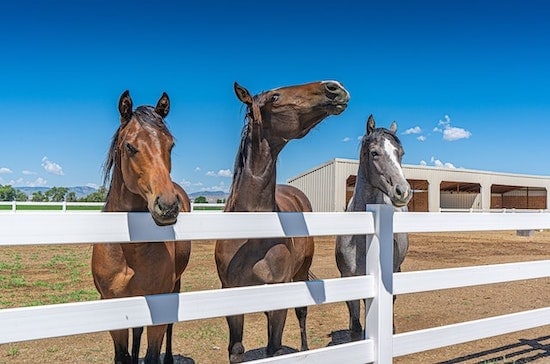
What Are Some Other Verbal Cues Horses Understand?
Most horses understand basic cues like clucking, kissing, or whistling. However, the interpretation of the sound depends on how the horse has been trained throughout its life.
The meaning of clucking tends to be consistent amongst all horses. This is because it is a sound used by humans universally to ask the horse to move forwards. Kissing is often similar but is slightly less common.
I once rode a horse that was trained to canter from the kissing noise, as well as pressure from the rider’s legs. I had trouble getting the horse to canter until the owner told me how he had been trained. After that, we were cantering in no time.
Some horses are trained to come in from the field to a whistle rather than calling their name. These horses usually connect the whistle with their owner and/or feed time. These owners would have trained their horses over time to come to the sound of their whistle.
Racehorses or high-performance horses are often trained to urinate on a whistle cue. To begin, the handler whistles every time the horse urinates. Over time, the horse associates the sound of the whistle with urinating. Once they understand this connection, the horse can be cued to urinate on command. This is often done for ease of obtaining urine for random drug testing.
Do Horses Understand Words in Different Languages?
Horses in different parts of the world are trained to respond to words in the language common to that area. For example, a horse in America would be taught the English word, whereas one in France may know the French version.
If you tried the same word, but in a different language, the horse will be unlikely to respond. This is because the word will sound entirely different to them, even though to us it means the same thing.
The same could be seen with cues given in different accents. The same word is used, but in a heavy accent, it can sound completely foreign.
If the horse does respond, it is likely because it has recognized some other indicator that usually accompanies the word. This could be the tone, pitch, or body language used by the person.
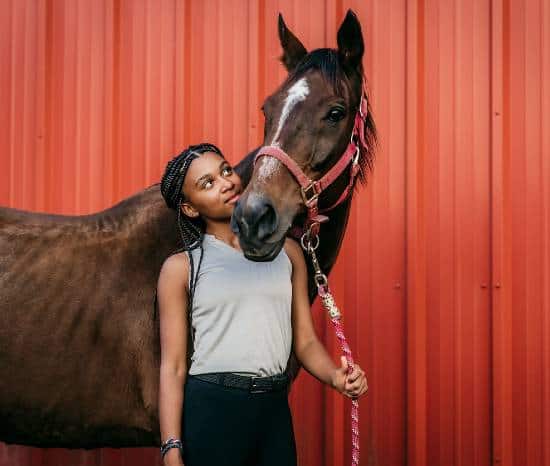
Do Horses Like When Humans Talk to Them?
In general, horses do like it when humans talk to them. They may not understand what we are saying, but enjoy the sound of us talking in a relaxed and calm voice.
Talking to your horse in such a way can help to strengthen your bond. There is evidence that horses can remember the voices of their primary handlers. This is especially true when voice accompanies other signs of affection, such as when you hug your horse.
If Horses Don’t Understand Words, Why Are We Told to Talk to Them?
From the first time we are around horses, we are told to talk to them. Some people even sing to their horses. However, this is likely more to influence the person rather than the horse.
Talking or singing helps people to regulate their own emotions. It gives their mind something else to focus on. This can be especially helpful if someone is nervous or anxious. It can also help people to process their own emotions, especially after periods of major stress, grief, or anger.
If we are more in control of our own emotions, horses are more likely to be comfortable around us. This is because they rely predominantly on body language to communicate.
Because humans rely heavily on verbal communication, we are not as tuned in to body language as horses are. Therefore, we are not very good at hiding our body language to appear more confident or relaxed to a horse.
Final Thoughts
While horses understand words, they only do so through training. They are not born with an understanding of human words or conversation. Additionally, the sound of the word is likely to have more meaning to them than the word itself. Talking to your horse in a calm tone can help strengthen your bond, as the sound is soothing for them.

